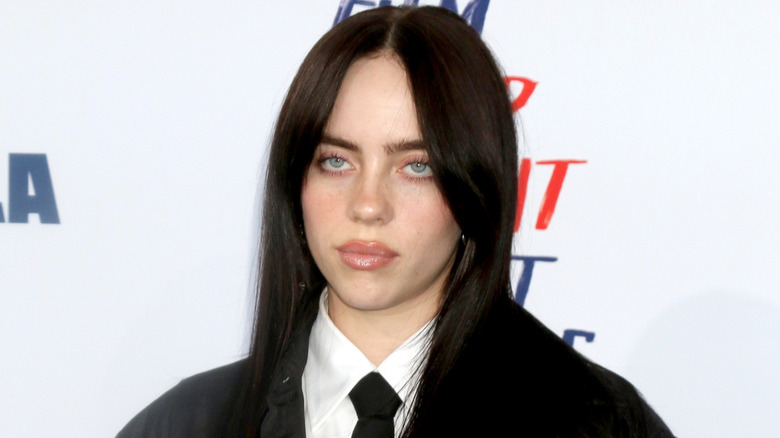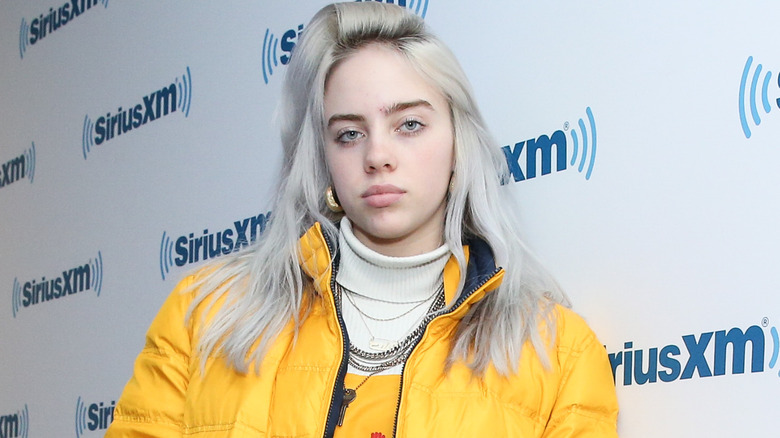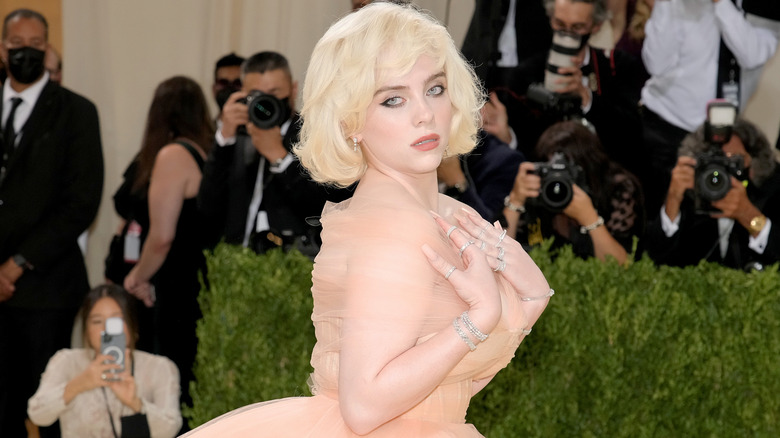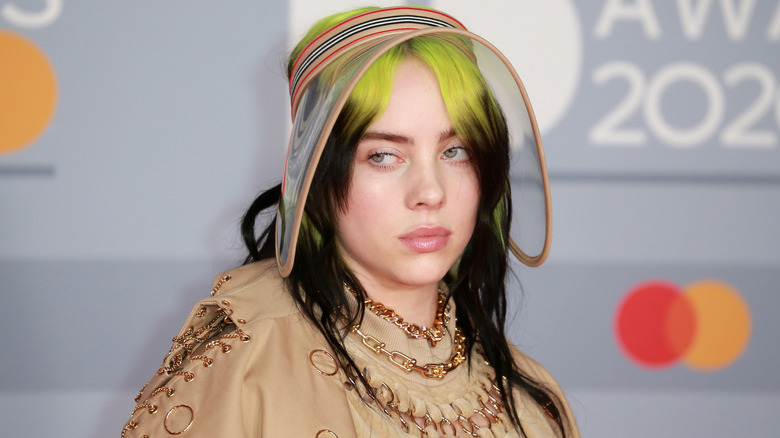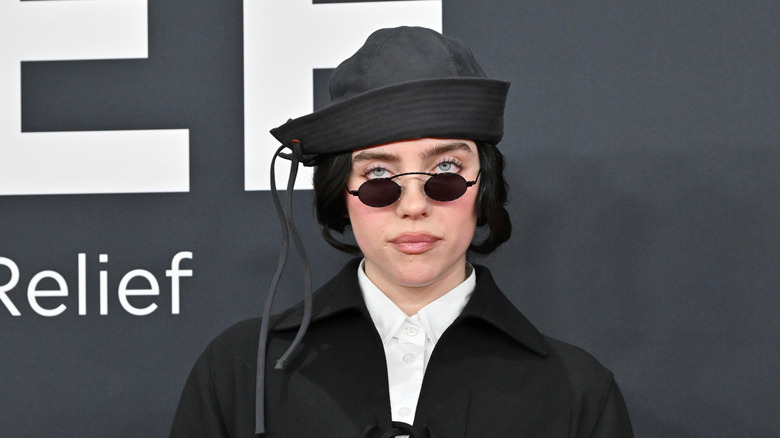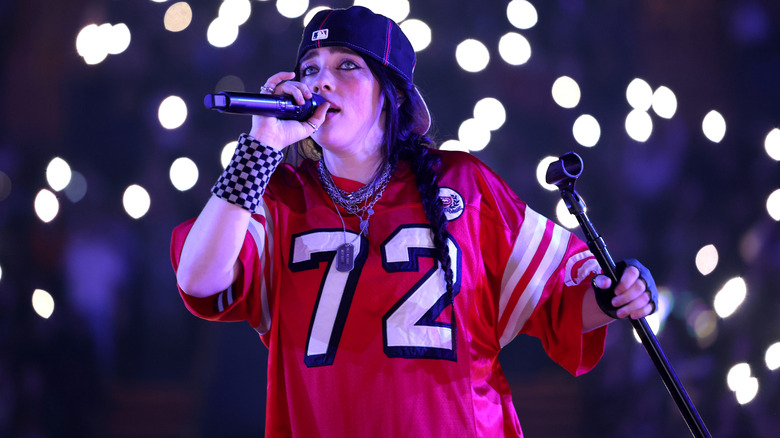Tragic Details About Billie Eilish's Life
The following article includes mentions of domestic abuse, sexual violence, and mental health issues.
While Billie Eilish has already undergone a lifetime's worth of stunning transformations — metamorphosing from a grungy, green-haired teenager to an effervescent bombshell blonde, back to a grungy pop legend — she is young. But her experiences read like a 70-year-old rock star reminiscing for a memoir. Eilish has been wholeheartedly open about her personal plights before and after fame. Her struggles with mental health and body image have bled into her career (a career she started at 13 years old, going viral on SoundCloud with her and brother Finneas O'Connell's at-home dreamy synth-pop creation, "Ocean Eyes").
Her teenage years were consumed by both stratospheric praise from millions who love her music and the isolating feeling of depression. Now a full-fledged adult, Eilish has used her platform to advocate for body positivity, as well as for those who have been sexually abused — all of which she has personally experienced. Her airy voice has sung tunes of heartbreak, abuse of power, and other heavy-hearted topics. Knowing the tragic story of Billie Eilish makes her haunting music that much more understandable.
Billie Eilish's crippling mental health issues
It started with an injury. Once a competitive dancer in all styles — jazz, hip hop, tap, contemporary, etc. — Billie Eilish suffered a growth plate fracture in her hip at 13 years old, inhibiting her mounting talent in the sport and spiraling the young artist into a depression. She told Rolling Stone, "It sent me down a hole. I went through a whole self-harming phase — we don't have to go into it. But the gist of it was, I felt like I deserved to be in pain." It's why, she says, she reaches out to fans with visible self-harm scars. "I've said to a couple of them, 'Just be nice to yourself,'" said Eilish. "Because I know. I was there."
The multi-Grammy award winner's meteoric foray into music overlapped with the darkest point in her life, and the irony is not lost on Eilish. "When anyone else thinks about Billie Eilish at 14, they think of all the good things that happened," she told the magazine. "But all I can think of is how miserable I was." A 17-year-old Eilish revealed to CBS's Gayle King that her inability to do normal teenage things was a considerable detriment to her mental health, but the reward of singing on stage was healing. "I'm in the happiest place of my life," she told King in 2019 (via NME), adding, "and I didn't think that I would even make it to this age."
If you or someone you know needs help with mental health, please contact the Crisis Text Line by texting HOME to 741741, call the National Alliance on Mental Illness helpline at 1-800-950-NAMI (6264), or visit the National Institute of Mental Health website.
Billie Eilish faced body shaming at a young age
Billie Eilish's urge to self-harm also came from the profound emotional toll that body shaming had on the young idol. "The reason I used to cut myself was because of my body," she told Vanity Fair in 2021. "To be quite honest with you, I only started wearing baggy clothes because of my body." That same baggy, androgynous style became a vital part of Eilish's musical identity. It led to a myriad of inappropriate inquiries about what lay beneath the wardrobe, and the subsequent assumption that she kept herself in a blanket of fabric so as not to be sexualized as a teenager. But Eilish has asserted that that wasn't her intent. "I didn't want people to have access to my body, even visually," she told Variety about her style choices at the beginning of her career. "I wasn't strong enough and secure enough to show it. If I had shown it at that time, I would have been completely devastated if people had said anything."
Her confidence grew in the ensuing years. In 2020, she debuted her short film titled "Not My Responsibility," which featured a spoken-word poem with lines like: "If I wear what is comfortable / I am not a woman / If I shed the layers / I'm a sl** / Though you've never seen my body / You still judge it / And judge me for it / Why?" It is part of the reason she embraced an awe-inspiring change to her style, leaving behind her large trousers and green and black hair for corsets and a blonde shag. She debuted the look in her now-viral 2021 Vogue cover, after telling the magazine: "Showing your body and showing your skin – or not – should not take any respect away from you."
Billie Eilish was sexually abused as a minor
Naturally, as the voice of a whole generation of women, Billie Eilish has laid herself bare in more than one piece of work. Her song "Your Power," on her sophomore album "Happier Than Ever," has provided insight into an issue that is quite personal for Eilish. "It's an open letter to people who take advantage – mostly men," she revealed in her Vogue profile. The gut-punching lyrics, juxtaposed by a soft, ethereal melody, read: "You said you were a hero, you played the part / But you ruined her in a year, don't act like it was hard."
When Eilish was a minor, she was sexually abused. Although she chooses to keep the details private, she now understands the seriousness of the situation, having matured with age. "People forget that you can grow up and realize s*** was f***ed up when you were younger," she said. Eilish further claimed that sexual abuse is more common than one may think. "I don't know one girl or woman who hasn't had a weird experience, or a really bad experience," she said, adding, "And men, too – young boys are taken advantage of constantly." She revealed that some of her lyrics even reflect stories that her friends have confided in her.
If you or anyone you know has been a victim of sexual assault, help is available. Visit the Rape, Abuse & Incest National Network website or contact RAINN's National Helpline at 1-800-656-HOPE (4673).
If you or someone you know is dealing with domestic abuse, you can call the National Domestic Violence Hotline at 1−800−799−7233. You can also find more information, resources, and support at their website.
'Violent' pornography gave Billie Eilish sleep problems
The "Bad Guy" hitmaker was exposed to sexual violence online, too. Billie Eilish made a candid confession on "The Howard Stern Show" about her past pornography fixation, an emotionally damaging viewing habit she picked up at 11 years old. "I think it really destroyed my brain, and I feel incredibly devastated that I was exposed to so much porn," she said. Watching what she described as "violent" content skewed her perception of sex. "The first few times I, you know, had sex, I was not saying no to things that were not good," she said, adding, "It was because I thought that's what I was supposed to be attracted to."
It even led her to experience problems like sleep paralysis and night terrors. Eilish opened up about her complicated relationship with sleep with Apple Music's Zane Lowe in 2019, revealing that it was inspiration for her first album. Eilish experienced extreme, recurring nightmares that obscured her reality. "It really, just like, f***ed me up," she said. "It affected the way that I viewed things and how I was, you know, talking to people and how I was thinking." Her battle with sleep paralysis inspired one of her top hits, "bury a friend," where she plays her "own monster under [her] own bed," in the music video.
Billie Eilish mourned multiple fans' deaths over the years
Despite Billie Eilish fans' lack of a unified title (e.g., "Swifties" or "Little Monsters"), her connection to her listeners couldn't be more intense, especially because most of them are around the same age as her, creating a sense of equality. Her reaction to multiple fan tragedies is a testament to her devotion.
In 2019, Eilish publicly mourned the deaths of two of her young fans, Skylar Davies and Kira Stanley. "Rest easy, beautiful girl," the pop star wrote in a tribute to Davies on her Instagram Story, per People. In a subsequent post on her Story, Eilish wrote of Stanley's death: "F***. I don't understand why is this all happening... I love you so much Kira. Please fly high. Rest in peace."
Further heartbreak ensued in January 2024, when Eilish superfan Madison Alfano died in a car crash. The "Birds of a Feather" singer shared a heartfelt video, sending condolences to the family. "You will always be with me, forever and a day," Eilish said (via Facebook). Then, in November 2024, three other Eilish fans suffered a devastating car crash on their way to her concert. Lucy Yeates and Kole Cunningham were killed, while Lucy's twin, Aubrey Yeates, was hospitalized, according to Fox 4 Kansas City. On an Instagram post about the fatal incident, Eilish wrote, "Sending so much love to the families. so heartbreaking."
